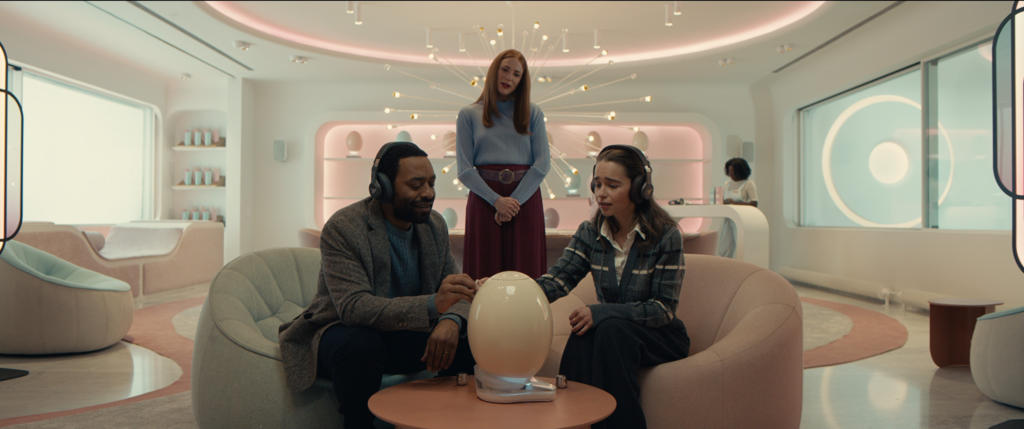POD GENERATION, THE
(director/writer: Sophie Barthes; cinematographer: Andrij Parekh; editors: Ron Patane/Olivier Bugge Coutte; music: Evgueni Galperine/Sacha Galperine; cast: Emilia Clarke (Rachel), Chiwetel Eijofor (Alvy Novy), Rosalie Craig (Linda Wozcheck-Womb Center Director), Vinette Robinson (Alice), Jean-Marc Barr (Pegazus Founder), Jelle De Beule (Ben); Runtime: 111; MPAA Rating: NR; producers: Genevieve Lemal/Yann Zenou/Nadia Khamlichi/Martin Metz; Scope Pictures; 2023-UK)
“A watchable but disappointing satire on fertility that fails to go beyond its techie sci fi conceptions.”
Reviewed by Dennis Schwartz
A watchable but disappointing satire on fertility that fails to go beyond its techie sci fi conceptions. It’s written and directed by Sophie Barthes (“Madame Bovary”/”Cold Souls”) to needle corporate science.
Though set in the future it looks like the present world. At the end of the 21st century, a New York couple, Rachel (Emilia Clarke) and Alvy (Chiwetel Eijofor), live in a high-rise apartment with various techie features such as having the shades glide up with the light.
Alvy is a self-employed botanist, while Rachel creates and markets AI assistants (mounted eyeballs) for a tech company called Folio.
One day Rachel’s boss calls her into his office and rewards her with a promotion. He asks the young woman if she’s planning on having a family, and says its not convenient for working families to have children.
The boss mentions he can pull strings to get her a spot at the very expensive and exclusive Womb Center, a place that has a different way of dealing with pregnancy and is sponsored by the giant tech company Pegazus. The Center’s technology can free women from them having their babies inside them. At the Womb Center, run by the hilarious Rosalie Craig, a London stage actress, the baby instead of living in the mother’s belly, has the fetus live in a pod that looks like a white plastic egg about a foot-and-a-half tall. There’s also a cap on top with small holes. In the pod, the fetus gets fed and gets to experience sounds, smells, and there are screens that can be programed to measure the baby‘s growth.
The pod solves some problems — the inconveniences of pregnancy, childbirth, and the playing field in the workplace becomes level for both genders — but the pod also creates something deceitful as it changes our intimate connections with childbirth by eliminating Mother Nature from the process.
Though Alvy objects to a synthetic birth, he goes along with his wife’s decision.
The lesson here is that the merger of the forces of technology and corporate power is not a good thing, as science in the merger gets embroiled with making big profits for its sponsors instead of just letting the science be the thing.
At best it’s an absurdist comedy of dehumanization– a dark tale showing how if not careful about we mean about progress we can become too detached from nature and lose our way in the world.
I had no problem with its themes, but the film had no bite to back up its opinions.
It played at the Sundance Film Festival.

REVIEWED ON 7/2/2023 GRADE: C+